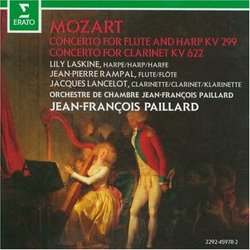| All Artists: Mozart, Rampal, Paillard Title: Flute & Harp Concerto Members Wishing: 0 Total Copies: 0 Label: Elektra / Wea Release Date: 5/11/1993 Genre: Classical Styles: Forms & Genres, Concertos, Historical Periods, Classical (c.1770-1830), Instruments, Reeds & Winds Number of Discs: 1 SwapaCD Credits: 1 UPC: 022924597824 |
Search - Mozart, Rampal, Paillard :: Flute & Harp Concerto
 | Mozart, Rampal, Paillard Flute & Harp Concerto Genre: Classical
|
Larger Image |
CD Details |
CD ReviewsSo simple and yet so visionary Jacques COULARDEAU | OLLIERGUES France | 08/09/2003 (5 out of 5 stars) "C Major is the easiest tone of them all as Einstein used to say. It's probably because this concerto was composed in 1778 in Paris for the Duke of Guines and his Daughter, the young Duchess, who were respectively flute and harp players. The harp is a liquid instrument and Mozart uses it to sound like a mountain stream dancing and bouncing down among rocks, as clear as a salmon going up the river or a trout jumping out of the water. The flute is an air-light instrument, perfect to evoke flying and singing birds in some trees. Their association produces the acme of beauty by bringing together breezy air and running water. It sounds bucolic, sylvan and like a village feast full of joy and pleasure, or even some French garden due to the perfect construction of the concerto, following in that the precepts of Mannheim. But Mozart is a lot more than that and he pokes his head in any hole in the hedges and he looks behind any tree to find new scenes, new themes, new flowers and he intertwines all the melodic lines into some light and gracious lacework that comes out as brilliant as the multifarious dewdrops in the morning softly and sweetly dancing and swinging on some spiderweb among the trees and bushes in the dawn-rising sun. When the academic tradition requires two themes Mozart uses four or five as if he had so much music in himself that it was overflowing, that he had to use it urgently and unload his overcrowded melodious vision. And yet there is some deeper and maybe more sombre atmosphere behind brought up by the orchestra, as if the orchestra was an echo of the world outside the aristocratic salon and there we feel the dark and strong force Mozart will invest in his masonic pieces. And Mozart remains a musical genius till the end : his final Rondo is announcing with all the power we can imagine him able to summon the music of some fifty years ahead, the everwhirling waltz of the 19th century.Dr Jacques COULARDEAU, University of Perpignan"
|

 Track Listings (6) - Disc #1
Track Listings (6) - Disc #1